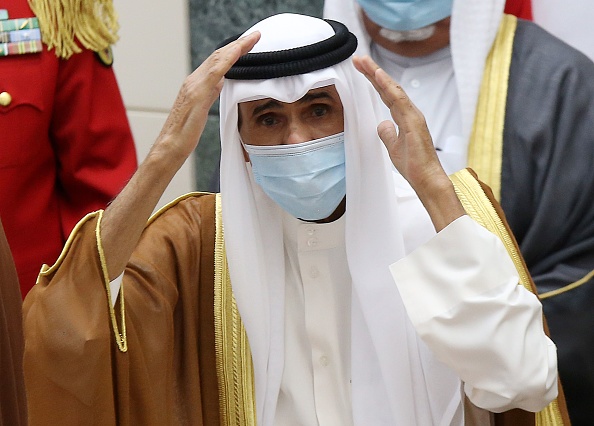"Today we lost a big brother and a wise and loving leader... who spared no effort for Arab unity," Jordan's King Abdullah II wrote on Twitter in Arabic.
Abu Dhabi Crown Prince Sheikh Mohammed bin Zayed Al Nahyan, the de facto ruler of the United Arab Emirates, tweeted: "Sheikh Sabah epitomised wisdom, tolerance, and peace and he was a great pioneer of Gulf cooperation."
UN Secretary General António Guterres called the emir "an extraordinary symbol of wisdom and generosity, a messenger of peace, a bridge builder".
Sheikh Sabah became foreign minister in 1963 and held the post for 40 years, a period that included the loss of his country when Saddam Hussein, the Iraqi despot, invaded in 1990. Sabah’s skilful diplomacy and experience helped the government gain international support for a US-led coalition that liberated Kuwait in the operation known as Desert Storm and later repaired relations with neighbouring countries that had supported the invasion. This gave him an a long-standing appreciation for America. An advocate of having U.S. forces in the Gulf region, he encouraged the establishment of American military bases there, including in Kuwait, where more than 13,000 U.S. troops are stationed. When he fell ill in July it was an American air-force plane that ferried him to the Mayo Clinic in Minnesota for treatment. There are also well established relations with Britain which sent troops in 1961 when Iraq had also sought to recover what it considers to be its lost 19th province.
Sheikh Sabah was known as a skilled diplomat and an expert negotiator who tried to mediate disputes in the volatile region. In 2003, he was named prime minister by his half-brother Emir Sheikh Jaber al-Ahmad. In the same year, after the U.S. invasion of Iraq, Sabah led the normalisation of ties with Baghdad which then helped to reconcile relations between Iraq and other Gulf states.
Sabah sought to avoid the disagreements taking place among neighbouring countries. He played a key role in setting up the Gulf Cooperation Council (GCC) in 1981 and, in recent years, as he assumed the mantle of an elder statesman, the Emir has sought to reconcile the dispute between Qatar and a Saudi and UAE-led bloc. He also worked hard to mediate in the Yemen war, hosting a meeting between opposing sides.

Ascending to the throne in 2006, Sheikh Sabah led Kuwait during a period of political turmoil as a series of popular uprisings sent shockwaves across the Middle. In the wake of the upheaval he deployed Kuwait’s wealth to mediate through aid and philanthropy. He refrained from intervening in Syria's civil war, instead he hosted several donor conferences for humanitarian aid.
Sheikh Nawaf al-Ahmad al-Sabah, named crown prince of the oil producing country in 2006, is in line to succeed his brother Sheikh Sabah. The new ruler in waiting may find it harder than his predecessor to uphold his country’s mediating role between rival Gulf powers, if only because he lacks his late brother’s decades of experience. Nevertheless, he has had an extensive political career and held positions of importance during crucial moments for the country. He is known as a founder of the country’s national guard and has attempted to build security cooperation with Arab states.
As interior minister, Sheikh Nawaf personally mediated the peaceful resolution of the 1980 Boeing 727 flight hijacking, convincing the two Jordanians responsible to surrender without harming any passengers. He was also in the position during terror attacks such as the 1983 bombings at six key Kuwaiti and foreign sites, including the US embassy. Sheikh Nawaf was defence minister when Iraqi troops rolled into the oil-rich emirate in 1990, and also served as interior minister in the face of challenges from Islamist militants.
Sheikh Nawaf is popular within the ruling Al Sabah family and reported to have been a consensus choice for ruler. His discreet manner and openness to different points of view will be essential for maintaining balance and international gravitas. Significant change to the nation's "positive neutrality" policy is unlikely during his reign.
But the new Emir has huge challenges ahead of him. Kuwait is facing the highest budget deficit in its history, brought on by the drop in oil prices and the coronavirus pandemic. A potential solution to its brewing liquidity crisis has been blocked by parliamentary opposition to a law that would allow the government to borrow, as other Gulf nations have done in response to the dual crisis. While Kuwait’s oil and foreign policy is unlikely to change, its domestic political landscape could be shift under the new emir.









